| Listing 1 - 10 of 17 | << page >> |
Sort by
|
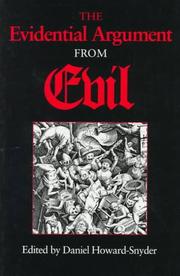
ISBN: 0253210283 Year: 1996 Volume: *3 Publisher: Bloomington ; Indianapolis Indiana University Press
Abstract | Keywords | Export | Availability | Bookmark
 Loading...
Loading...Choose an application
- Reference Manager
- EndNote
- RefWorks (Direct export to RefWorks)
Theodicy. --- God--Permissive will --- God--Will Permissive --- Permissive will of God --- Theodicee --- Theodicy --- Théodicée --- Evil, Problem of (Theology) --- God --- Problem of evil (Theology) --- Good and evil --- Permissive will --- Will, Permissive
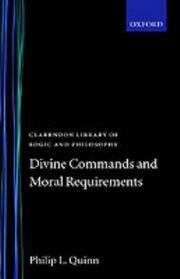
ISBN: 0198244134 0191680753 9780198244134 Year: 1978 Publisher: Oxford: Clarendon,
Abstract | Keywords | Export | Availability | Bookmark
 Loading...
Loading...Choose an application
- Reference Manager
- EndNote
- RefWorks (Direct export to RefWorks)
General ethics --- Religious studies --- Divine commands (Ethics) --- Religious ethics --- God --- Will --- 241.3 --- 241*06 --- -Divine commands (Ethics) --- Divine command theory of ethics --- Theological voluntarism --- Religion and ethics --- Metaphysics --- Misotheism --- Monotheism --- Religion --- Theism --- Religions --- Ethics --- Theologische ethiek: recht en wet --- Moraaltheologie: methodiek --- Religious ethics. --- Will. --- 241*06 Moraaltheologie: methodiek --- 241.3 Theologische ethiek: recht en wet --- Divine commands (Ethics). --- God - Will
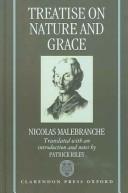
ISBN: 0198248326 Year: 1992 Publisher: Oxford Clarendon Press
Abstract | Keywords | Export | Availability | Bookmark
 Loading...
Loading...Choose an application
- Reference Manager
- EndNote
- RefWorks (Direct export to RefWorks)
God --- -Grace (Theology) --- -Nature --- -Metaphysics --- Misotheism --- Monotheism --- Religion --- Theism --- Will --- -Early works to 1800 --- Early works to 1800 --- Religious aspects --- -Christianity --- Nature --- Grace (Theology) --- God (Christianity) --- Christianity --- -Will --- Trinity --- Nature - Religious aspects - Christianity - Early works to 1800. --- Grace (Theology) - Early works to 1800. --- God - Will - Early works to 1800.
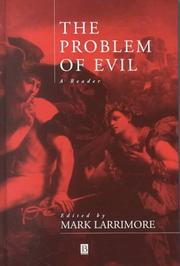
ISBN: 0631220143 Year: 2001 Publisher: Oxford Malden, Mass. Blackwell
Abstract | Keywords | Export | Availability | Bookmark
 Loading...
Loading...Choose an application
- Reference Manager
- EndNote
- RefWorks (Direct export to RefWorks)
Bien et mal --- Evil [Problem of ] --- God--Permissive will --- God--Will Permissive --- Goed en kwaad --- Good and evil --- Kwaad [Probleem van het ] --- Mal [Problème du ] --- Permissive will of God --- Probleem van het kwaad --- Problem of evil --- Problème du mal --- Theodicee --- Theodicy --- Théodicée --- Theodicy. --- Religious aspects.
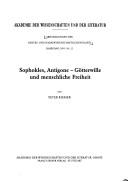
ISBN: 3515060030 9783515060035 Year: 1991 Volume: 1991,12 Publisher: Stuttgart: Steiner,
Abstract | Keywords | Export | Availability | Bookmark
 Loading...
Loading...Choose an application
- Reference Manager
- EndNote
- RefWorks (Direct export to RefWorks)
Antigone (Greek mythology) in literature. --- Free will and determinism in literature. --- Gods, Greek, in literature. --- God --- Will. --- Antigone (Greek mythology) in literature --- Free will and determinism in literature --- Gods, Greek, in literature --- -Metaphysics --- Misotheism --- Monotheism --- Religion --- Theism --- Will --- Sophocles --- -Will --- Sofokles --- Sophocle --- Sofocle --- Sophokles --- Sofocles --- Divine commands (Ethics) --- Sophocles. --- God - Will.
Book
ISBN: 0883444631 9780883444634 Year: 1982 Publisher: Maryknoll, NY: Orbis,
Abstract | Keywords | Export | Availability | Bookmark
 Loading...
Loading...Choose an application
- Reference Manager
- EndNote
- RefWorks (Direct export to RefWorks)
Christianity and politics --- Discernment (Christian theology) --- God --- Will --- -Discernment (Christian theology) --- 271-7 --- Christian life --- Metaphysics --- Misotheism --- Monotheism --- Religion --- Theism --- Christianity --- Church and politics --- Politics and Christianity --- Politics and the church --- Political science --- Godsdienstig leven, liturgie, vroomheid en koordienst in religieuze orden en congregaties --- Political aspects --- 271-7 Godsdienstig leven, liturgie, vroomheid en koordienst in religieuze orden en congregaties --- God (Christianity) --- God - Will
Book
ISBN: 9781409438755 1409438759 9781409438762 9781472400505 9781315590912 9781317109587 9781317109594 9781138248007 Year: 2013 Publisher: Farnham: Ashgate,
Abstract | Keywords | Export | Availability | Bookmark
 Loading...
Loading...Choose an application
- Reference Manager
- EndNote
- RefWorks (Direct export to RefWorks)
This critical study of Karl Barth's Christian theological ethics discusses Barth's controversial and characteristically misunderstood ethics of divine command. The surprising relation of his 'divine command ethics' to contemporary 'narrative theology' and 'virtue ethics' and specific moral themes concerning bonds between parents and children, the nature of truth telling, and the meaning of Christian love of God and neighbor are all discussed. This book reveals Barth's richness, depth, and insight, and places his work in constructive connection with salient themes in both Catholic and Protestant ethics. Attentive to the fullness of Barth's Christological vision and to the purposes and limits of his reflections on the Christian life in pursuit of the good, William Werpehowski also advances conversations in Christian ethics about the nature of practical deliberation and decision, the orientation and dispositions that embody moral faithfulness, and the question and features of 'natural morality.'
Christian ethics. --- 2 BARTH, KARL --- 2 BARTH, KARL Godsdienst. Theologie--BARTH, KARL --- Godsdienst. Theologie--BARTH, KARL --- Ethical theology --- Moral theology --- Theology, Ethical --- Theology, Moral --- Christian life --- Christian philosophy --- Religious ethics --- Barth, Karl, --- Parŭtʻŭ, Kʻal, --- Barth, Karol, --- Barŭtʻŭ, Kʻal, --- Barŭtʻŭ, --- Bate, --- בארת, קרל, --- カール·バルト, --- 巴特, --- Divine commands (Ethics) --- Christian ethics --- God --- Will. --- God - Will. --- Barth, Karl, - 1886-1968 --- Barth, Karl
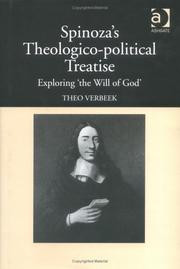
ISBN: 0754604934 9780754604938 Year: 2003 Publisher: Aldershot: Ashgate,
Abstract | Keywords | Export | Availability | Bookmark
 Loading...
Loading...Choose an application
- Reference Manager
- EndNote
- RefWorks (Direct export to RefWorks)
Spinoza, Baruch --- God --- Will --- History of doctrines --- Spinoza, Benedictus de, --- 215.1 --- 1 SPINOZA, BARUCH --- -Metaphysics --- Misotheism --- Monotheism --- Religion --- Theism --- Verhouding godsdienst en filosofie --- Filosofie. Psychologie--SPINOZA, BARUCH --- -History of doctrines --- -Spinoza, Benedictus de --- -Verhouding godsdienst en filosofie --- 1 SPINOZA, BARUCH Filosofie. Psychologie--SPINOZA, BARUCH --- 215.1 Verhouding godsdienst en filosofie --- -215.1 Verhouding godsdienst en filosofie --- Divine commands (Ethics) --- God - Will - History of doctrines - 17th century. --- Spinoza, Benedictus de, - 1632-1677. - Tractatus theologico-politicus.
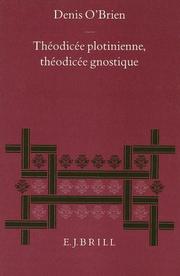
ISSN: 00791687 ISBN: 9004096183 9004320776 9789004096189 Year: 1993 Volume: 57 Publisher: Leiden: Brill,
Abstract | Keywords | Export | Availability | Bookmark
 Loading...
Loading...Choose an application
- Reference Manager
- EndNote
- RefWorks (Direct export to RefWorks)
Résumé en français et anglais
God--Permissive will --- God--Will Permissive --- Permissive will of God --- Theodicee --- Theodicy --- Théodicée --- Plotinus --- Criticism and interpretation --- Theodicy. --- 1 <38> PLOTINUS --- #GROL:SEMI-1-05'02' Plot --- Evil, Problem of (Theology) --- God --- Problem of evil (Theology) --- Good and evil --- Griekse filosofie--PLOTINUS --- Permissive will --- Will, Permissive --- Boluoding --- Iflūṭīn --- Plotin --- Plotino --- Plōtinos --- Plotinus, --- Plotyn --- Πλωτι̂νος --- פלוטינוס --- أفلوطين --- 1 <38> PLOTINUS Griekse filosofie--PLOTINUS --- Plotinos --- Théodicée --- Plotinus. --- Criticism and interpretation.
Book
ISBN: 9782503534220 2503534228 Year: 2011 Volume: 6 Publisher: Turnhout: Brepols,
Abstract | Keywords | Export | Availability | Bookmark
 Loading...
Loading...Choose an application
- Reference Manager
- EndNote
- RefWorks (Direct export to RefWorks)
La théodicée de Plotin et la théodicée chrétienne d’Origène et Grégoire de Nysse ont plusieurs éléments en commun: l’identification du mal et du non-être, l’idée d’un ordre rationnel de la réalité provenant du principe divin, l’élaboration d’une notion unitaire de mal. Cependant, ces similarités cachent des logiques très différentes. Pour Plotin, la solution au problème du mal réside dans la demonstration de sa nécessité en tant que produit non accidentel de la procession. Pour Origène et Grégoire de Nysse, par contre, c’est dans l’élaboration d’une idée radicale de liberté et dans l’instabilité ontologique de la créature qu’il faut chercher la solution. Ce livre analyse ces deux théodicées, la théodicée de la nécessité et celle de la liberté, les confrontant à une série de “mésaventures”, afin de mettre en lumière aussi bien les difficultés surmontées par ces auteurs dans leur élaboration de la notion de mal que celles qui restent encore ouvertes.
God--Permissive will --- God--Will Permissive --- Permissive will of God --- Theodicee --- Theodicy --- Théodicée --- Theodicy. --- Plotinus. --- Origen. --- Gregory, --- 276 =75 ORIGENES --- 276 =75 GREGORIUS NYSSENUS --- 1 <38> PLOTINUS --- 276:1 --- Griekse patrologie--ORIGENES --- Griekse patrologie--GREGORIUS NYSSENUS --- Griekse filosofie--PLOTINUS --- Patrologie. Patristiek-:-Filosofie. Psychologie --- Theodizee. --- Plotinus, --- Origenes, --- Gregorius --- Gregorius, --- 1 <38> PLOTINUS Griekse filosofie--PLOTINUS --- Théodicée --- Plotinus --- Criticism and interpretation --- Origen --- Gregory of Nyssa
| Listing 1 - 10 of 17 | << page >> |
Sort by
|

 Search
Search Feedback
Feedback About UniCat
About UniCat  Help
Help News
News